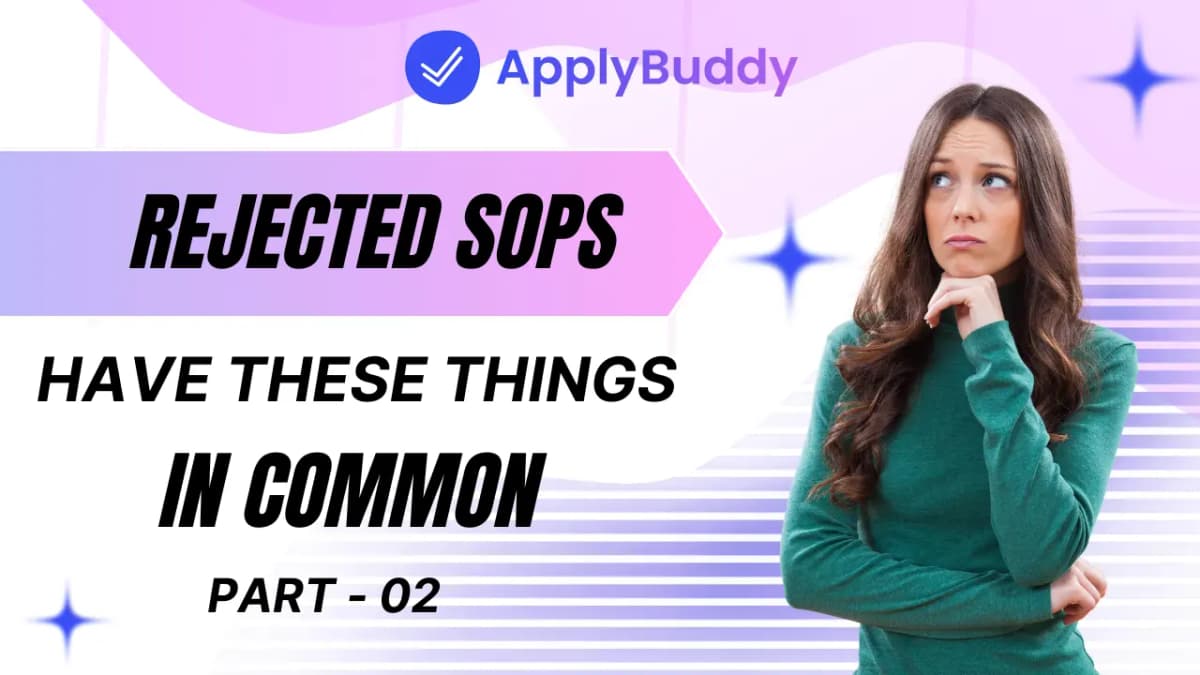Rejected SOPs have these things in Common (Part-2)
Avoid these common SOP mistakes that can weaken your university application. Write a clear, structured, and compelling SOP that grabs attention.
April 4, 2025

Check your personalized list of shortlisted universities now!
Easily track application deadlines, requirements, and acceptance chances for your shortlisted universities, get personalized recommendations to refine your list further.
Writing a compelling Statement of Purpose (SOP) isn't just about avoiding last-minute rushes or sticking to a structure—it's also about how you present your story. Many applicants unknowingly weaken their SOP by using clichés, overloading it with technical jargon, or failing to tailor it to each university. Worse, some even resort to copying from sample SOPs or exaggerating achievements, thinking it will make their application stand out.
In this second part of our guide on Common SOP Mistakes to Avoid, we'll cover these subtle but critical errors that can hurt your chances of admission. If you haven't read the first part yet, check it out here to ensure your SOP doesn't fall into the most common pitfalls!
6. Using Clichés, Jargon, or an Improper Tone
When writing a Statement of Purpose (SOP), finding the right tone and language is crucial. Many applicants fall into common traps such as using clichés, stuffing their SOP with unnecessary technical jargon, or being too direct or overly casual in the introduction and conclusion. These mistakes can make the SOP unoriginal, difficult to read, or unprofessional.

Common Issues to Avoid
-
🗣 Use of Clichéd Phrases:
-
"I have always been interested in technology."
-
"Ever since I was a child, I knew I wanted to be an engineer."
-
"This program is my dream come true."
-
-
📚 Too Much Technical Jargon:
-
Over-explaining every technical project in detail instead of summarizing key contributions.
-
Using complex terminology that doesn't add value to your SOP.
-
-
🚫 Weak Introductions & Conclusions:
-
Beginning too directly: "I want to apply for this program because I like data science."
-
Ending too casually: "I hope you consider my application. Thanks!"
-
How to Fix These Issues
✔ Be Original: Use specific, personal anecdotes instead of generic statements.
✔ Use Jargon Sparingly: Explain complex topics in a way that a broader audience can understand.
✔ Refine the Tone: Start with a compelling hook and end with a confident, professional closing.
A strong SOP should feel personal, engaging, and clear—without relying on overused phrases or unnecessary complexity!
7. Generic SOPs which Lack Originality
A Statement of Purpose (SOP) should reflect your personal journey, ambitions, and academic goals. However, many applicants make the mistake of copying content from sample SOPs, failing to seek feedback, exaggerating their achievements, or neglecting thorough research. These errors can significantly weaken your application and even lead to rejection.

Common Pitfalls to Avoid
-
📄 Copying from Online Samples:
-
Using template phrases that many other applicants also use.
-
Admissions committees can recognize generic or plagiarized content, which may result in outright rejection.
-
-
🎭 Making the SOP Too Flashy:
- Making unrealistic claims can make your SOP seem fabricated rather than impressive.
-
🔍 Not Doing Enough Research:
- Failing to mention specific faculty, courses, or research areas makes it seem like you haven't explored the program in depth.
How to Fix These Issues
✔ Write in Your Own Words: Share your genuine experiences and aspirations.
✔ Get a Second Opinion: Ask mentors or professors to review your SOP.
✔ Stay Realistic: Highlight achievements honestly instead of exaggerating.
✔ Research Thoroughly: Tailor your SOP to the university's faculty, courses, and research opportunities.
A strong SOP should be original, well-researched, and authentic—never copied or exaggerated!
8. Adding False Information
When writing a Statement of Purpose (SOP), honesty is crucial. Some applicants make the mistake of exaggerating achievements, fabricating experiences, or misrepresenting their credentials to make their application appear stronger. Lying in an SOP is a Serious Mistake and can have serious consequences. If discovered, false information can result in expulsion from the program or or even blacklisting from future applications.

Common Types of False Information
-
🏆 Exaggerating Achievements & Extracurriculars: Claiming to have won awards or participated in research projects that you were never involved in. Mentioning leadership roles or volunteering experiences that never happened.
-
💼 Fabricating Work Experience : Stating that you worked at a company or interned somewhere without actual proof.
-
🔎 Background Verification is Common: Some institutions cross-check the details provided in your SOP with your academic records, work experience, and recommendation letters. Providing misleading GPA scores or academic accomplishments will lead to rejection.
How to Avoid This Mistake
✔ Be Honest and Transparent: Focus on real achievements and experiences, even if they seem small.
✔ Highlight Genuine Strengths: Emphasize skills, learning experiences, and goals instead of inventing accomplishments.
✔ Provide Verifiable Information: Ensure that everything mentioned in your SOP can be supported by documents or recommendations.
✔ Focus on Growth and Potential: Universities value authenticity and a willingness to learn more than exaggerated claims.
A truthful SOP not only strengthens your application but also reflects your integrity and credibility as a candidate!
9. Not Researching the University for Customized SOPs
A well-crafted Statement of Purpose (SOP) should demonstrate a clear understanding of the university and program you are applying to. However, many applicants make the mistake of either skipping proper research, excessively praising the university without substance, or submitting a generic SOP to multiple schools. These errors can make your SOP seem insincere and reduce your chances of acceptance.
Common Mistakes to Avoid
-
🛑 Skipping University Research:
-
Failing to mention faculty, courses, or research areas specific to the program.
-
Writing a generic SOP that could apply to any school.
-
-
🙌 Overpraising the University:
-
Saying things like "This is the best university in the world" without supporting details.
-
Using exaggerated compliments instead of focusing on how the program aligns with your goals.
-
-
✏️ Not Tailoring SOPs for Each School:
-
Submitting the same SOP to multiple universities without modifications.
-
Universities receive thousands of applications—specific details about their program can make yours memorable.
-
How to Fix These Issues
✔ Research Faculty, Courses, and Labs: Mention specific professors, subjects, or resources that interest you.
✔ Focus on Fit, Not Flattery: Explain why the university's program aligns with your academic and career aspirations.
✔ Customize Every SOP: Tailor each application to reflect the strengths and offerings of the specific school.
Taking the time to research and personalize your SOP shows dedication and significantly improves your application's impact!
10. Skipping Proofreading and Feedback
One of the biggest mistakes applicants make whe
writing their Statement of Purpose (SOP) is neglecting to proofread and edit their work. A well-written SOP can significantly improve your chances of acceptance, but even small grammatical errors, typos, or poorly structured sentences can leave a negative impression on the admissions committee. Failing to seek feedback from professors or mentors further increases the risk of submitting a weak application.

Common Mistakes to Avoid
-
🚫 Skipping Multiple Rounds of Edits:
-
Submitting the first draft without revision.
-
Not reading your SOP aloud to check for awkward phrasing.
-
-
🔠 Ignoring Grammar and Formatting Issues:
-
Even minor errors like misspellings and punctuation errors make an SOP look unprofessional.
-
Inconsistent font sizes, spacing, or formatting can reduce readability.
-
-
👨🏫 Not Seeking Feedback from Professors or Mentors:
-
Professors can provide valuable insights on content, structure, and clarity.
-
A second pair of eyes can catch mistakes you might overlook.
-
How to Fix These Issues
✔ Proofread Multiple Times: Read your SOP carefully, checking for typos and unclear sentences.
✔ Use Grammar Tools: Utilize tools like Grammarly or Hemingway Editor for basic corrections.
✔ Get External Feedback: Ask professors, mentors, or peers to review your SOP.
✔ Make Final Edits: Ensure proper structure, grammar, and logical flow before submission.
A well-edited SOP enhances your credibility and professionalism, making a strong case for your admission!
FAQs: Rejected SOPs have these things in Common (Part-2)
1. How do I personalize my SOP for each university?
To personalize your SOP, research each university's faculty, courses, research areas, and unique program strengths. Mention specific professors whose work aligns with your interests and explain why their program is the right fit for your career goals.
2. Can I use technical jargon in my SOP?
Yes, but use it sparingly. Admissions officers may not always be experts in your niche field, so ensure that your SOP remains accessible and engaging. Focus on explaining your experiences and contributions in simple terms.
3. Is it okay to include a quote in my SOP?
While a well-chosen quote can add personality, it's often unnecessary and takes up valuable space. Your SOP should focus on your personal journey and motivations rather than relying on external words.
4. How many drafts should I go through before finalizing my SOP?
Ideally, go through at least 3-5 drafts. Start with a rough draft, refine the structure, get feedback from mentors or professors, and proofread thoroughly before submitting.
5. Should I mention my weaknesses or failures in the SOP?
Yes, but only if they highlight personal growth. Frame challenges as learning experiences that helped you improve and develop valuable skills relevant to your field.
Your SOP is your chance to showcase your individuality, academic journey, and aspirations. But small missteps—like using generic phrases, being too technical, or skipping research—can turn a strong application into a forgettable one. Universities value authenticity, clarity, and a genuine connection to their program, so take the time to refine your SOP and make every word count.
If you haven't yet, be sure to check out the first part of this guide here for more crucial SOP mistakes to avoid. With the right approach, your SOP can be a powerful asset in securing your dream admit! 🚀

Stay Ahead with Exclusive Insights!
Subscribe to our newsletter for the latest updates, career opportunities, and expert tips delivered straight to your inbox. Join our community and never miss out!


